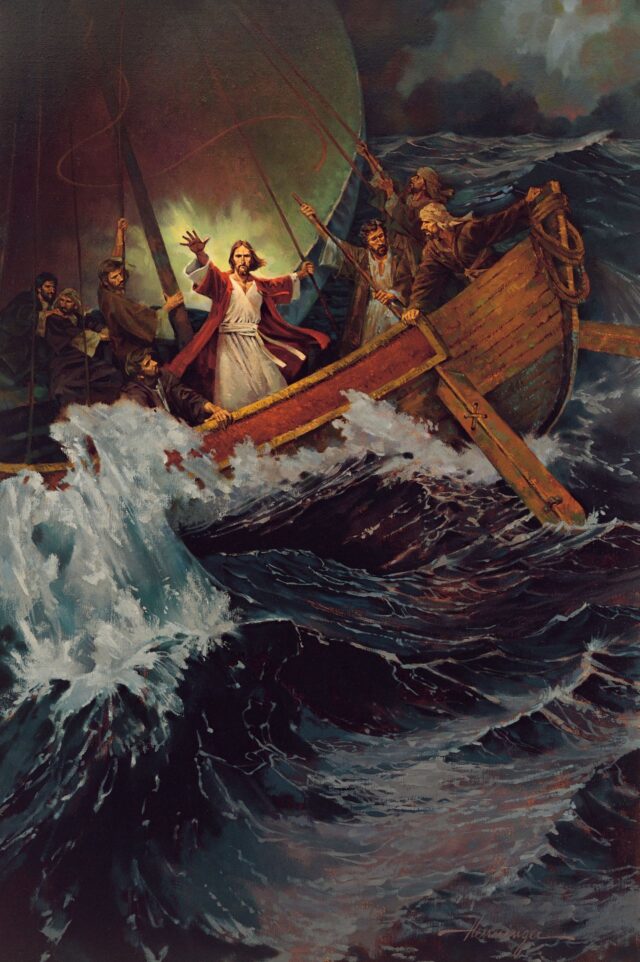To accompany your Come Follow Me study for February 27-March 5
In addition to reading the indicated chapters, you may wish to:
- Read the applicable portions of the New Testament Institute Student Manual at
- https://www.churchofjesuschrist.org/study/manual/new-testament-student-manual/introduction-to-matthew/chapter-4?lang=eng
- https://www.churchofjesuschrist.org/study/manual/new-testament-student-manual/introduction-to-mark/chapter-11?lang=eng
- https://www.churchofjesuschrist.org/study/manual/new-testament-student-manual/introduction-to-the-gospel-according-to-st-luke/chapter-16-luke-4-8?lang=eng
- See the following videos:
- Come Follow Me (Feb 27-Mar 5) Matthew 8; Mark 2–4; Luke 7 | Miracles at Come Follow Me (Feb 27-Mar 5) Matthew 8; Mark 2–4; Luke 7 | Miracles – YouTube
- The Widow of Nain at https://www.youtube.com/watch?v=o_4LpZgm2nw
- Calming the Tempest at https://www.youtube.com/watch?v=hj0cVBYKaEg
- Jesus Forgives Sins and Heals a Man Stricken with Palsy at https://www.youtube.com/watch?v=VW4-wxIB1pA
- The Gospel According to Matthew (from minute 48:30-58:48) at https://www.youtube.com/watch?v=woAhReBytBk&t=6494s
- The Gospel of Mark Visual Bible (from 5:54-19:21) at https://www.youtube.com/watch?v=BcdgY7V4jZ4&t=1190s
- The Gospel of Luke (from 1:10:35-1:20:31) at https://www.youtube.com/watch?v=2PHPLApTt7Y
If you would like a Kahoot game related to this material which you could use for personal study or use with your family or your class, click here: https://create.kahoot.it/share/matthew-8-mark-2-4-luke-7/c6c38a6e-d29a-4714-bf3e-31b77fe1debf. (To use it with a group, after clicking on this link, you will need to log into Kahoot, creating a free account if you have not done so previously, then click on the blue “Start” button.)
Points to Ponder in Matthew 8; Mark 2-4; Luke 7
It is great that we have four different accounts of Jesus’ life and mission in the New Testament, but it can sometimes be confusing when one writer relates events in a different order from that given by another. This week, for example, we will look more closely at Jesus’ healing of a paralytic, who was let down through a hole in the roof, though we previously read of that incident in Luke 5 and will encounter it again when we get to Matthew 9. And this week we first come upon a couple of Jesus’ parables, but we will defer discussion of them until we get to Matthew 13. Our primary focus this week will be on Jesus’ miracles and what we can learn from them.
1. How many different kinds of miracles can you identify in this week’s reading? (Count “routine” healing of the infected as just one “kind.”)
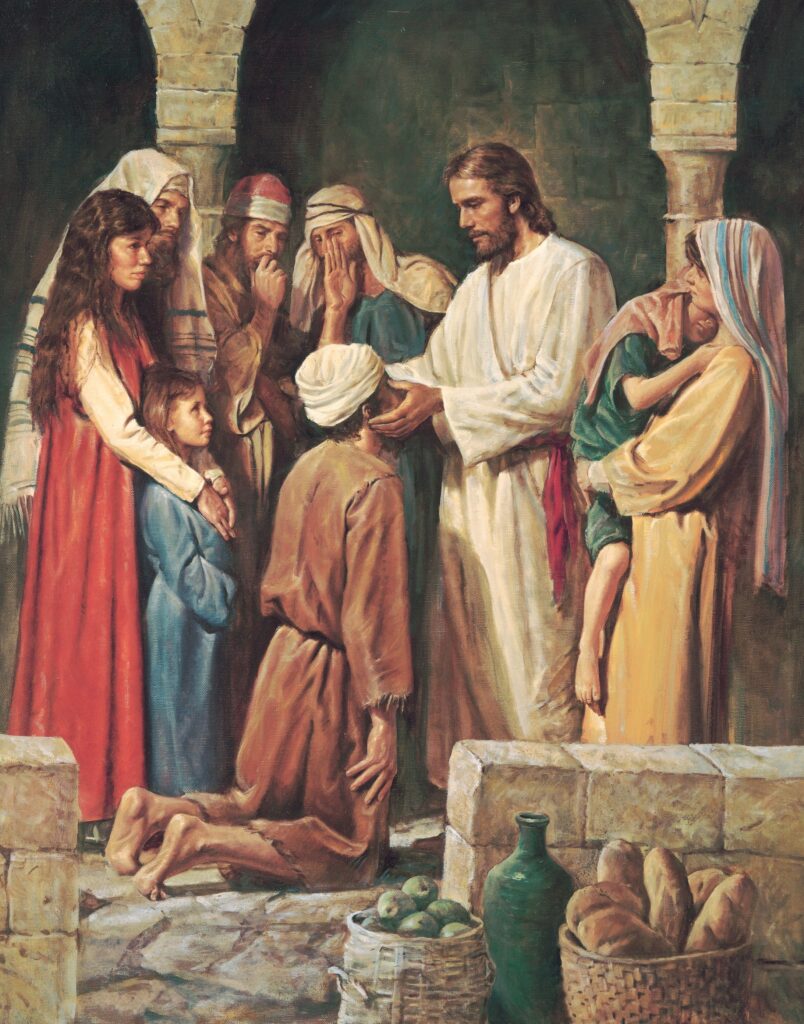
2. Which of Jesus’ miracles in this week’s reading did you personally find most impressive? Why?
3. By way of review, what did we decide were the two major purposes for Jesus’ miracles? Can you cite at least 2-3 miracles which seem to you to fall primarily into each of those categories?
4. Under what circumstances would we be justified in using priesthood power to control the elements, as Jesus did in calming the storm? What cases of divine intervention in the elements are you personally aware of?
5. What else impresses you about the details of the miracles Jesus performed in this week’s reading?
6. Why was Jesus so seemingly inconsiderate as to not want a prospective disciple take care of the burial of his father before beginning his work? (Matthew 8:21-22.)
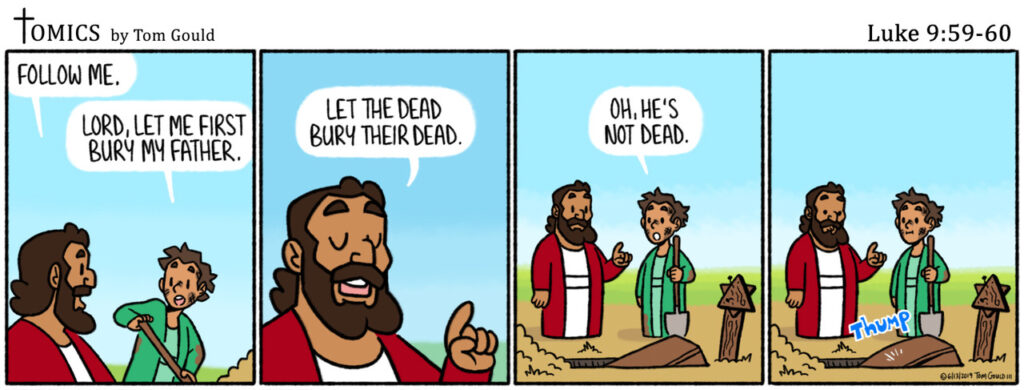
7. Why did Jesus kill 2000 pigs belonging to the Gadarenes? (Matthew 8:28) Can you blame them for wanting him to “depart out of their coasts”? What would the Society for the Prevention of Cruelty to Animals have had to say about this incident?

8. What does Jesus mean when he says that “the children of the kingdom shall be cast out into outer darkness,” where “there shall be weeping and gnashing of teeth”? (Matthew 8:12). Aren’t Church members “children of the kingdom”?
9. Is it true that the man with the palsy in Mark 2:4-5 wasn’t able to walk because of his sins? Why does Jesus first tell him, “Son, thy sins be forgiven thee”?
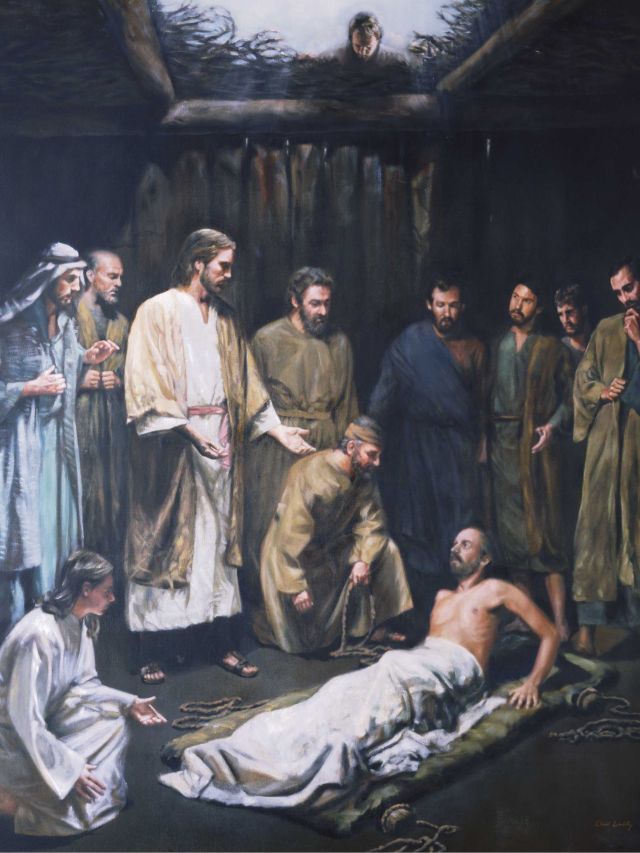
10. Aren’t we encouraged to pick good friends, who will help us maintain our standards? Don’t the Pharisees have a point when they complain about Jesus and His disciples spending so much time with “publicans and sinners”? (Mark 2:16)
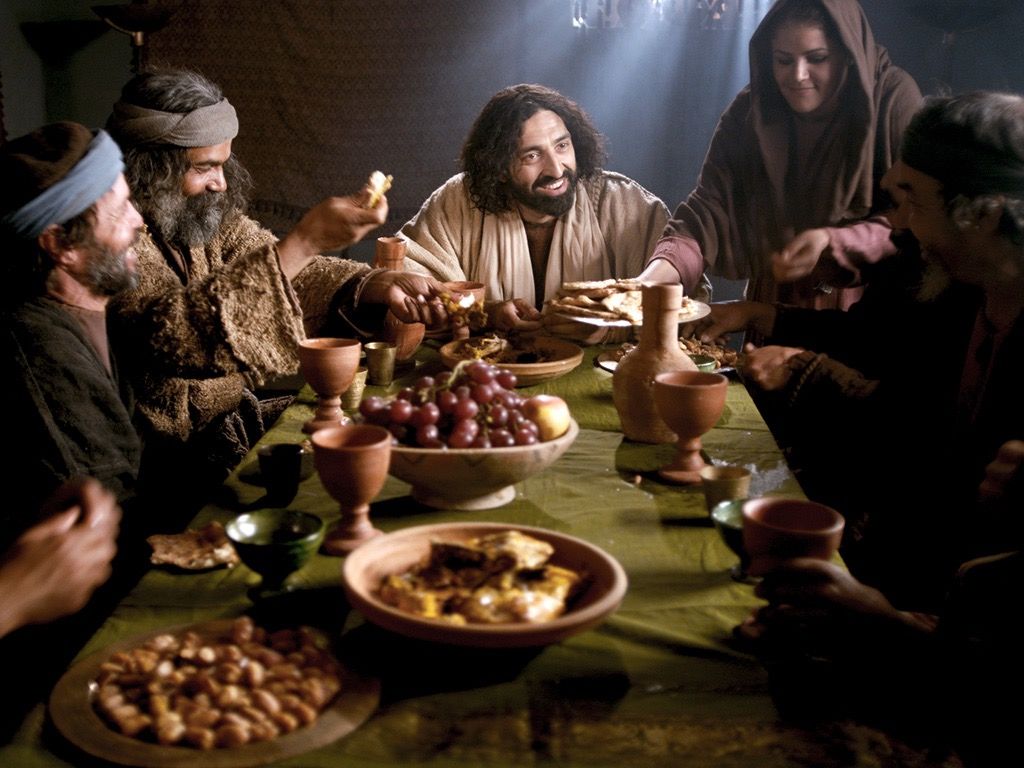
11. Why does Jesus seem so uninterested that His family has come to see Him in Mark 3:31-35)
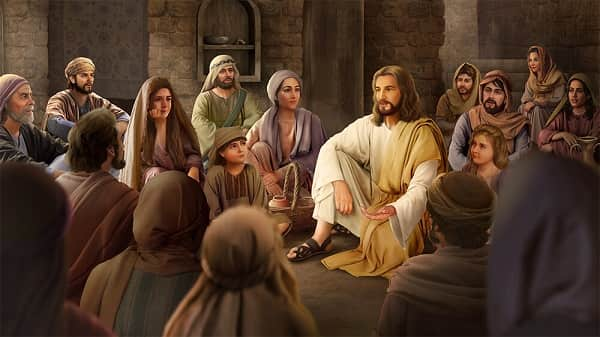
12. Why does Jesus rank John the Baptist at the top of all the prophets, when he held only the Aaronic Priesthood, performed no recorded miracle, and left no written record? (Luke 7:28) If John is that great, how is it possible that “he that is least in the kingdom of God is greater than he”?
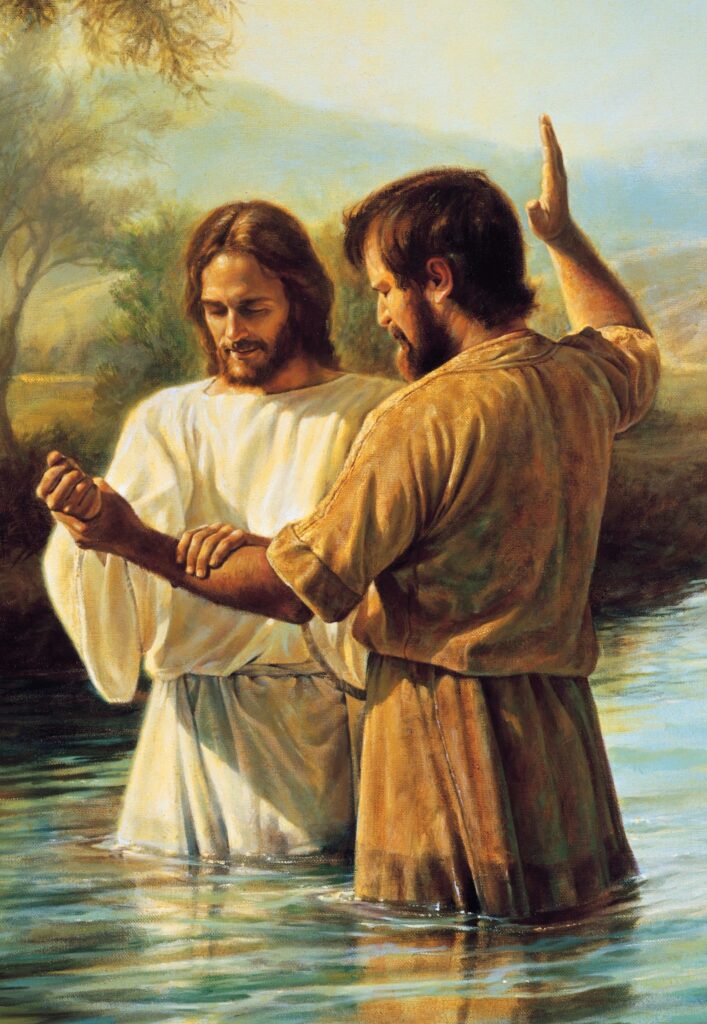
13. What passage in Luke 7 could be especially useful to full time missionaries?
14. How can you translate Luke 7:35 (“Wisdom is justified of all her children”) so that it makes sense?

15. Is it true that just by loving a lot we can be forgiven of our sins? What is Jesus really saying in Luke 7:47?
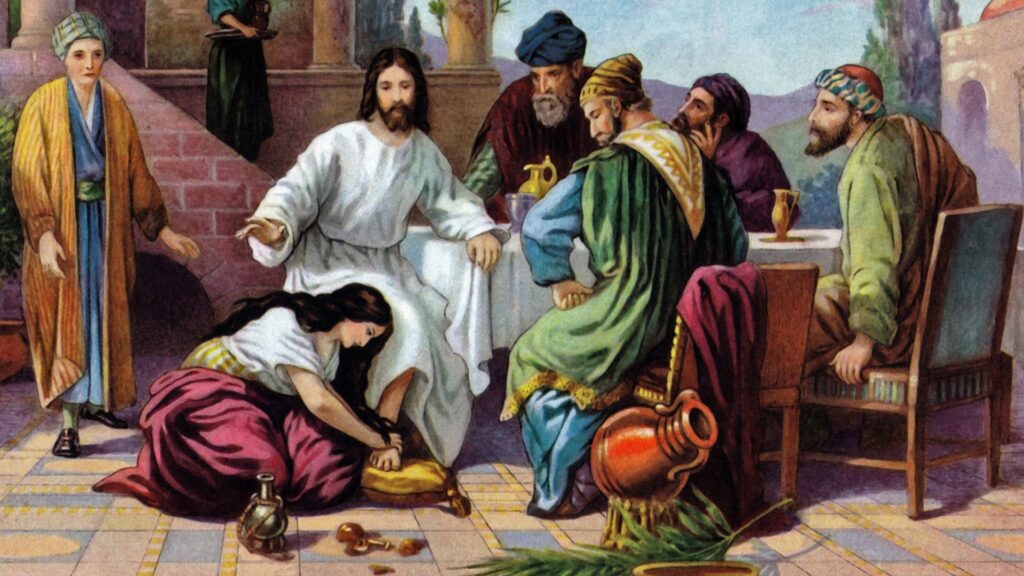
Possible Answers to Points to Ponder in Matthew 8; Mark 2-4; Luke 7
1. How many different kinds of miracles can you identify in this week’s reading? (Count “routine” healing of the infected as just one “kind.”)
Here’s one possible way to classify them:
- Healing of those with an apparent infection, such as
- A leper (Matthew 8:3)
- Peter’s mother-in-law (Matthew 8:15)
- Multitudes of the sick (Matthew 8:16)
- Many healed of various plagues on the shore of the sea (Mark 3:10)
- Many with “infirmities and plagues” in response to the inquiry by John’s messengers (Luke 7:21)
- Repairing damaged or deficient body organs
- A centurion’s servant with palsy (paralysis) (Matthew 8:13; Luke 7:10)
- Restoring sight to the blind and hearing to the deaf (Luke 7:21-22)
- Man with the palsy (paralysis), let down through the roof (Mark 2:4)
- Man with a withered hand (Mark 3:3-5)
- Casting out of devils
- Many in Matthew 8:16
- One (according to the JST, despite Matthew’s reference to two) in the country of the Gergesenes (Matthew 8:28), possessed by so many devils that they possessed an entire herd of pigs after being cast out of the man.
- Controlling the weather (calming the storm) (Matthew 8:26; Mark 4:39)
- Raising the dead: Son of the widow of Nain (Luke 7:11-15)
2. Which of Jesus’ miracles in this week’s reading did you personally find most impressive? Why?
Your choice. To me they would probably be:
- The raising of the dead son of the widow of Nain, the first recorded time in which the Savior raised someone from the dead. Some could claim the sick just got better on their own, but never had the dead been known to spontaneously arise.
- The calming of the sea, which was a large scale, spectacular miracle showing Jesus’ control of the elements.
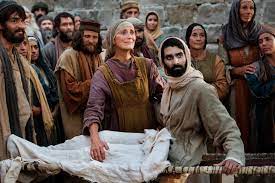
3. By way of review, what did we decide were the two major purposes for Jesus’ miracles? Can you cite at least 2-3 miracles which seem to you to fall primarily into each of those categories?
All miracles seem to accomplish one or both of the following purposes:
- Show a tender mercy to the recipient or his or her loved ones. Virtually all the miracles chronicled in this week’s reading could be said to accomplish this purpose.
- Serve as a witness of Jesus’ power and authority. At least the following, according to the scriptural record, seem to have accomplished this:
- The healing of the paralytic, whose sins Jesus indicated were forgiven.
- The casting out of the devils from the man in the country of the Gergesenes.
- The healing of multitudes on the seashore, cited in Matthew 8:16-17 as fulfillment of a prophecy of Isaiah.
- The public healing of the man with the withered hand on the sabbath in Mark 3:1-5.
- The calming of the sea.
- The raising of the dead son of the widow of Nain in the presence of many onlookers. (Luke 7:14-18)
- The healing of the blind, deaf, and others as a witness to John the Baptist’s followers (Luke 7:20:22)
4. Under what circumstances would we be justified in using priesthood power to control the elements, as Jesus did in calming the storm? What cases of divine intervention in the elements are you personally aware of?
I think one would need to feel special inspiration at a time of unusual need to command the elements in the name of the Lord and expect them to obey. I can’t say I have personally ever witnessed that. But I have seen the Lord take the initiative to control the elements when such was needed to further His work or to preserve His children. I remember an outdoor fireside for investigators and less active members on a hillside in Guatemala, where it was raining all around, except for a small area directly above where we were sitting. And I have a daughter-in-law and granddaughter who can testify that the Lord calmed the sea around them in response to prayer when they were in danger of drowning and were caught too far from shore while swimming.
5. What else impresses you about the details of the miracles Jesus performed in this week’s reading?
Your choice. My list would include:
- Jesus told the leper in Matthew 8:4, “See thou tell no man.” Miracles are usually intended to bless and confirm the faith of the believers, not entertain the faithless.
- Jesus was able to heal the centurion’s servant at a distance. (Matthew 8:13)
- Jesus commended the Gentile centurion as having greater faith than any He had found in Israel. (Matthew 8:10)
- Jesus gave the same power of healing to His apostles, and priesthood holders today have that same authority. (Mark 3:15)
6. Why was Jesus so seemingly inconsiderate as to not want a prospective disciple take care of the burial of his father before beginning his work? (Matthew 8:21-22.)
The passage need not be understood as involving a man whose father had just died and who wanted permission to take care of his burial. More likely, the father was advancing in years but not on his deathbed, and the would-be disciple was asking if he could wait months or years until his father finally passed away before beginning his active service. Jesus was teaching that there was some urgency to His work and that others less potentially useful could take care of the father and see that he got a proper burial when the time came.
7. Why did Jesus kill 2000 pigs belonging to the Gadarenes? (Matthew 8:28) Can you blame them for wanting him to “depart out of their coasts”? What would the Society for the Prevention of Cruelty to Animals have had to say about this incident?
Jesus was evidently testing the priorities of the Gadarenes, and they spectacularly failed the test! Rather than rejoice that there was one among them who could free a mortal son of God from his long-standing demonic possession, they were more concerned about their loss of potential pork. Certainly, the Lord doesn’t enjoy seeing any of His creations suffer, but it would appear that the pigs died quickly and comparatively painlessly and were quickly ushered into a spiritual realm where they would be much more comfortable than they ever had been in mortality. Many otherwise difficult scriptural passages are resolved when we remember that the Lord views death much differently than do mortals. To most, death is the ultimate tragedy. To the Lord, it is a welcome home!
8. What does Jesus mean when he says that “the children of the kingdom shall be cast out into outer darkness,” where “there shall be weeping and gnashing of teeth”? (Matthew 8:12). Aren’t Church members “children of the kingdom”?
The “children of the kingdom” to whom Jesus refers were the literal Israelites, who were supposed to have been the chosen people anciently, but who often proved to be less faithful than their Gentile neighbors. Such faithless Israelites risked being cast into outer darkness if they did not mend their ways. The same fate could await modern-day “children of the kingdom,” or baptized Latter-day Saints, who do not live up to the covenants they have made.
9. Is it true that the man with the palsy in Mark 2:4-5 wasn’t able to walk because of his sins? Why does Jesus first tell him, “Son, thy sins be forgiven thee”?
No, that is not what Jesus is teaching. But He is trying to teach that a spiritual healing, which brings a forgiveness of sins, is even more important than a physical healing. It was primarily to heal our spirits that Jesus came and provided the atonement. But it’s much easier for an onlooker to see a physical healing than to recognize a spiritual one. To provide evidence that He indeed had authority to forgive sins, the Savior went ahead and publicly healed the man with the palsy.
10. Aren’t we encouraged to pick good friends, who will help us maintain our standards? Don’t the Pharisees have a point when they complain about Jesus and His disciples spending so much time with “publicans and sinners”? (Mark 2:16)
Where would we be if all the doctors and nurses kept to themselves out of fear that by associating with sick people they could themselves become infected? Of course, they do take such precautions as wearing masks, washing their hands frequently, sterilizing their instruments, etc. But then they go ahead and do their best to treat the sick. Similarly, not only Jesus but His disciples needed to be among the spiritually ill—the “publicans and sinners”—if they were to be of any help to them. Naturally, we have to take precautions not to become infected by the sinful lifestyle of those to whom we may be ministering. But we can never help them unless we go where they are and associate with them in wholesome ways.
11. Why does Jesus seem so uninterested that His family has come to see Him in Mark 3:31-35)
In his book Jesus the Christ, Elder James E. Talmage commented: “Making use of the circumstance to impress upon all the fact that His work took precedence over the claims of family and kinship, and thereby explaining that He could not meet His relatives at that moment, He asked, ‘Who is my mother? and who are my brethren?’ Answering His own question and expressing in the answer the deeper thought in His mind, He said, pointing toward His disciples: ‘Behold my mother and my brethren! For whosoever shall do the will of my Father which is in heaven, the same is my brother, and sister, and mother’” (Talmage, Jesus the Christ, 272). We have every reason to believe Jesus loved His mother and siblings and treated them with great love and respect. But, as He indicated, all who accept His gospel become part of His family by adoption and have equal claim upon His attention.
12. Why does Jesus rank John the Baptist at the top of all the prophets, when he held only the Aaronic Priesthood, performed no recorded miracle, and left no written record? (Luke 7:28) If John is that great, how is it possible that “he that is least in the kingdom of God is greater than he”?
Jesus did not say that John outranked Moses and Elijah or other great prophets of antiquity, only that there were none greater. Greatness, thus, has nothing to do with one’s priesthood office, the miracles he performs, or the written scripture he produces, but rather with how he lives and the sacrifices he makes.
The Prophet Joseph Smith (1805–44) gave three reasons why John the Baptist is considered one of the greatest of prophets:
“First. He was entrusted with a divine mission of preparing the way before the face of the Lord. Whoever had such a trust committed to him before or since? No man.
“Secondly. He was entrusted with the important mission, and it was required at his hands, to baptize the Son of Man. Whoever had the honor of doing that? Whoever had so great a privilege and glory? …
“Thirdly. John, at that time, was the only legal administrator in the affairs of the kingdom there was then on the earth, and holding the keys of power. … These three reasons constitute him the greatest prophet born” (Teachings of Presidents of the Church: Joseph Smith [2007], 81–82).
When He speaks of “He that is least in the kingdom of God,” who would be greater than John, Jesus is referring to Himself, whom the Jews considered to be “the least in the kingdom of God.”
13. What passage in Luke 7 could be especially useful to full time missionaries?
Perhaps verse 30, which emphasizes the importance of baptism.
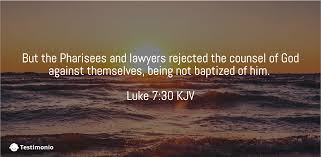
14. How can you translate Luke 7:35 (“Wisdom is justified of all her children”) so that it makes sense?
You’ll find lots of possibilities at https://www.biblegateway.com/verse/en/Luke%207:35. I like the New Living Translation: “But wisdom is shown to be right by the lives of those who follow it.”
15. Is it true that just by loving a lot we can be forgiven of our sins? What is Jesus really saying in Luke 7:47?
It seems to me that rather than say that the woman’s sins were forgiven because she loved much, Jesus is more likely saying that the great love she is displaying is evidence that her sins have previously been forgiven. Only those under the influence of the Holy Ghost can truly love that deeply, and only those who are sufficiently repentant as to have had their sins forgiven can have that Spirit with them.
